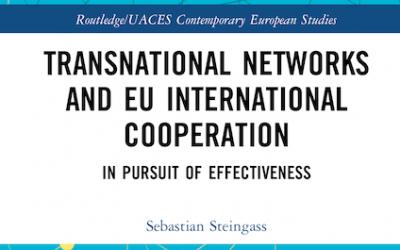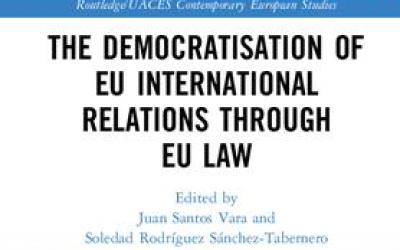
Implementing EU Mobility Partnerships
This book assesses the effectiveness of Mobility Partnerships and their consequences for third countries.
Read more
This book assesses the effectiveness of Mobility Partnerships and their consequences for third countries.
Read more
This book offers comprehensive coverage of various aspects of financial accountability around the EU budget.
Read more
This book provides a timely evaluation of the EU’s ability to act internationally and coordinate policy in a time when it also seeks to meet shifting demands of international cooperation.
Read more
The Dynamics of EU External Energy Relations examines the behaviour of the European Commission in EU external energy relations paying particular attention to the dynamics existing between the Commission and the member states. It examines the Commission as a constrained policy-entrepreneur trying to expand its power, budget and competences, yet frustrated by member states protective of their national sovereignty.
Read more
While the European integration project is facing new challenges, abandonments and criticism, it is often forgotten that there are powerful legal instruments that allow citizens to protect and extend their rights. These instruments and the actions taken to activate them are often overlooked and deliberately ignored in the mainstream debates.
Read more
The creation of the European External Action Service (EEAS), the EU’s new diplomatic body, was accompanied by high expectations for improving the way Europe would deal with foreign policy. However, observers of its first years of operation have come to the opposite conclusion.
Read more
This book examines the politics of Banking Union and EMU reform in the EU, and draws lessons for what it means for international politics, both in Europe, and for international relations more broadly. It demonstrates that most of the reforms in Europe to break free of the Eurozone and banking crises in which Europe continues to find itself focus on building up the capacities of national authorities rather than European ones.
Read more
Though the EU has tried to place human rights and democracy at the heart of its external action, there are serious concerns about its capacity to have a significant impact on the situation of human rights and human rights defenders as well as on the democratization processes taking place in different regions of the world.
Read more
The European Union (EU) is at the forefront of engaging in external trade relations outside of the World Trade Organization (WTO) with entire regions and economic powerhouses. Understanding why and how the EU engages in one of the most active fields of external relations is crucial.
Read more
Since the entry into force of the Treaty of Lisbon, key improvements have occurred in the democratisation of EU international relations through the increased powers of the European Parliament. Nevertheless, a comprehensive legal analysis of the new developments in democratic control of EU external action has not yet been performed.
Read more